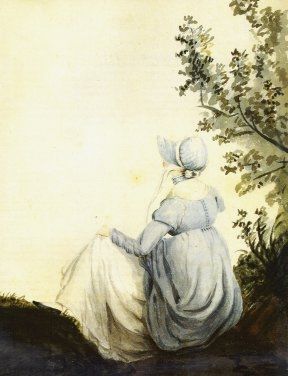I own twelve hats. That should answer any lingering questions you may have as to which type I am. In fact (I have just realized), I have more hats than pairs of shoes. This, despite the fact that like the actress Emma Ishta, “I have a tiny head, which means most hats don’t fit very well. I do love them, though.”
![[ D ] Edgar Degas - At the Milliner II](https://c8.staticflickr.com/8/7036/6858744743_ff2d9de6dd.jpg) I had thought there was no use loving them – until I turned 21, and had a costume party to celebrate. Since there will always be those who show up without costumes, I did a round of the second-hand shops, looking for random hats to inflict on them. And one of the hats I found actually fit me. It was a small fur pillbox hat – whether it’s real fur or not, I’m not sure. There might be some rather acrylicky beasts out there…
I had thought there was no use loving them – until I turned 21, and had a costume party to celebrate. Since there will always be those who show up without costumes, I did a round of the second-hand shops, looking for random hats to inflict on them. And one of the hats I found actually fit me. It was a small fur pillbox hat – whether it’s real fur or not, I’m not sure. There might be some rather acrylicky beasts out there…
It was a historic moment, for it was not until the Caped Gooseberry’s grandmother passed away that I once more came into the possession of a fitting hat. (Granddaughter-in-law is not usually a direct line of inheritance, but hey, if the hat fits…) She was a many-hatted lady, and I became bounteously hatted as a result.
My favourite of the whole hat inheritance is a soft mossy-coloured winter hat, with a dashing little brim. “Some hats can only be worn if you’re willing to be jaunty, to set them at an angle and to walk beneath them with a spring in your stride as if you’re only a step away from dancing,” Neil Gaiman wrote in Anansi Boys. This is that kind of hat. I love it.
 I also came in for a fine white straw (worn when she was introduced to Prince Charles) and a funky handmade multicoloured ‘safari hat.’ I do have some other hats that fit, but they’re made of wool, which stretches, and therefore doesn’t really count. One is knitted and the other is crocheted, and they were both gifts.
I also came in for a fine white straw (worn when she was introduced to Prince Charles) and a funky handmade multicoloured ‘safari hat.’ I do have some other hats that fit, but they’re made of wool, which stretches, and therefore doesn’t really count. One is knitted and the other is crocheted, and they were both gifts.
But I refuse to be hampered by the possession of a “tiny wee bonce,” as the last milliner I visited so charmingly expressed it. (No, she didn’t have anything that fit me.) I still own a number of hats that don’t fit – unless I wear a bandanna underneath.
There’s a wide-brimmed black felt; a cheap and nasty sunhat (the only one of my hats I bought new); a brown pageboy cap which gives the effect of a bonnet; an actual bonnet I made from a pattern in Jane Austen’s Sewing Box; and a jester cap (with bells, naturally) that the Caped Gooseberry and I made from instructions in The Hat Book.
 The most recent acquisition, however, is a writing hat – a suggestion of Kerry Greenwood’s. “I have a writing hat. It is a tricorne made from an old felt hat I had as a student. It tells me that I am writing, when I am wearing that hat. When I stop writing, I take it off… The hat also tells anyone who drops in on me to go away.” My writing hat is from a second-hand shop (naturally!) and is something I’d never seen before: a wide-brimmed fur. I don’t know what kind of animals the hat used to be; at a guess I’d say rabbit and fox. It’s got a soft dark crown and underbrim, with a big puffy brim of light brown (with white guard-hairs). The brim keeps my neck warm at the back and keeps distractions out of view to the front and sides.
The most recent acquisition, however, is a writing hat – a suggestion of Kerry Greenwood’s. “I have a writing hat. It is a tricorne made from an old felt hat I had as a student. It tells me that I am writing, when I am wearing that hat. When I stop writing, I take it off… The hat also tells anyone who drops in on me to go away.” My writing hat is from a second-hand shop (naturally!) and is something I’d never seen before: a wide-brimmed fur. I don’t know what kind of animals the hat used to be; at a guess I’d say rabbit and fox. It’s got a soft dark crown and underbrim, with a big puffy brim of light brown (with white guard-hairs). The brim keeps my neck warm at the back and keeps distractions out of view to the front and sides.
Fur is a contentious subject, I know, but I don’t see putting old furs in landfills as a good solution. I wouldn’t buy a new fur unless it was possum or rabbit (both environmental pests in New Zealand) or otherwise humanely farmed. I do, after all, wear sheepskin slippers (I’ve had the same pair for about fifteen years) and what is sheepskin but a sheep-fur? I draw the line at astrakhan, though – that’s just nasty.
 The reason I have chosen to wear this only as a writing hat is, simply put, cowardice. I am nervous about what reaction I might get if I wore a flagrantly fur hat in public. Admittedly, the Internet is very much public, but no one can hurl paint on me over the world wide web. I don’t know why paint-hurlers don’t seem to target those wearing leather hats. Or leather bikie gear. The only difference is that one still has the hair on, and the other doesn’t.
The reason I have chosen to wear this only as a writing hat is, simply put, cowardice. I am nervous about what reaction I might get if I wore a flagrantly fur hat in public. Admittedly, the Internet is very much public, but no one can hurl paint on me over the world wide web. I don’t know why paint-hurlers don’t seem to target those wearing leather hats. Or leather bikie gear. The only difference is that one still has the hair on, and the other doesn’t.
There are undoubtedly evils and abuses in the international fur trade, but it seems to me that the answer to abuses is not to ban the products altogether (excepting endangered species, obviously). The solution is to educate people about the origins of what they’re buying, so they can make ethical choices. We don’t shame egg-eaters, we ban the use of battery cages – and in the meantime, encourage people to buy free-range. Ditto with diamonds and the Kimberly Process (although that does seem to have its issues).
 So instead of flinging my warm and elegant hat into the compost bin, I will keep using it as a head-cosy until the chill of winter has passed for another year – at which point I will need to decide which will be the summer writing hat. Suggestions?
So instead of flinging my warm and elegant hat into the compost bin, I will keep using it as a head-cosy until the chill of winter has passed for another year – at which point I will need to decide which will be the summer writing hat. Suggestions?




